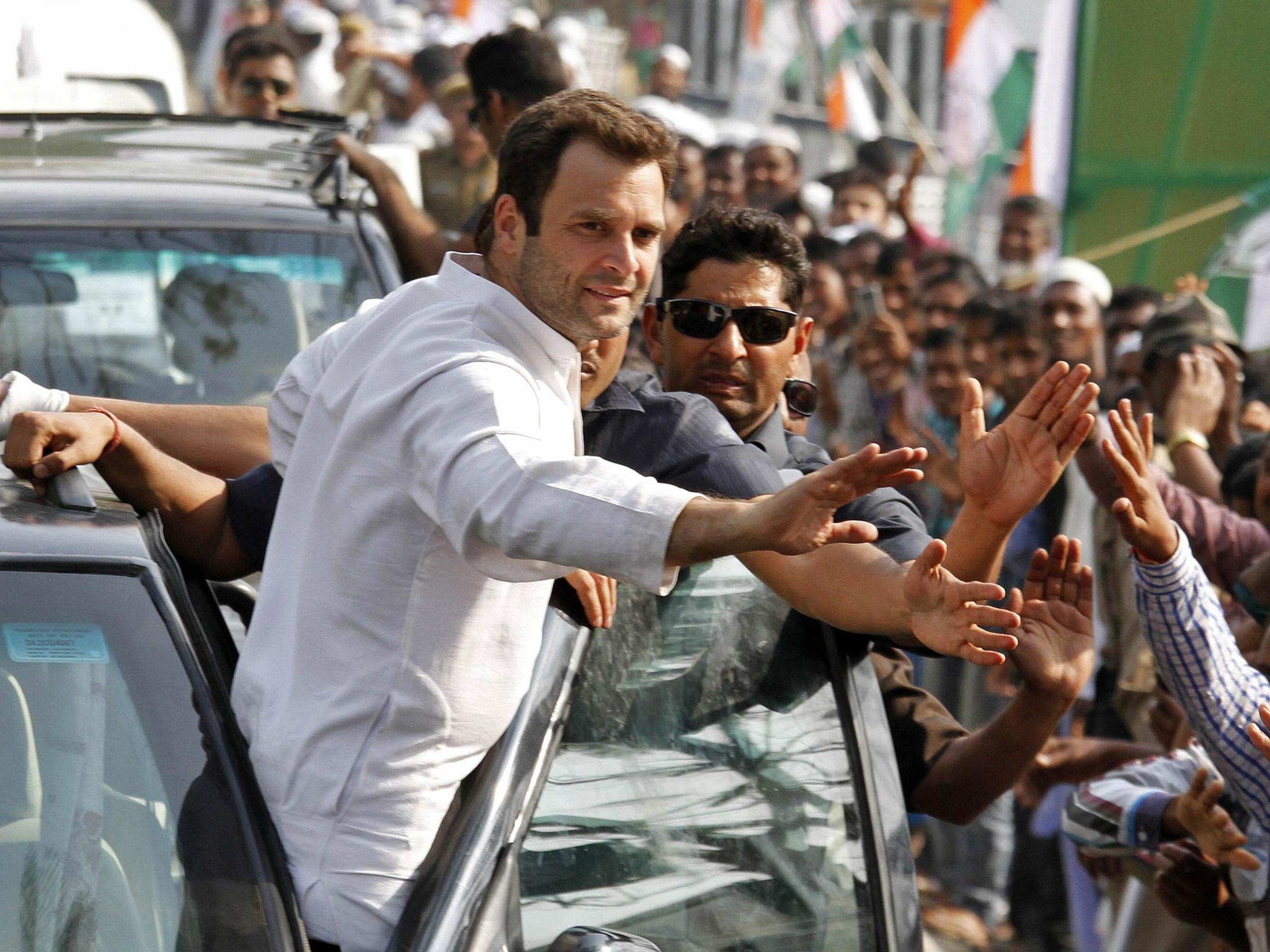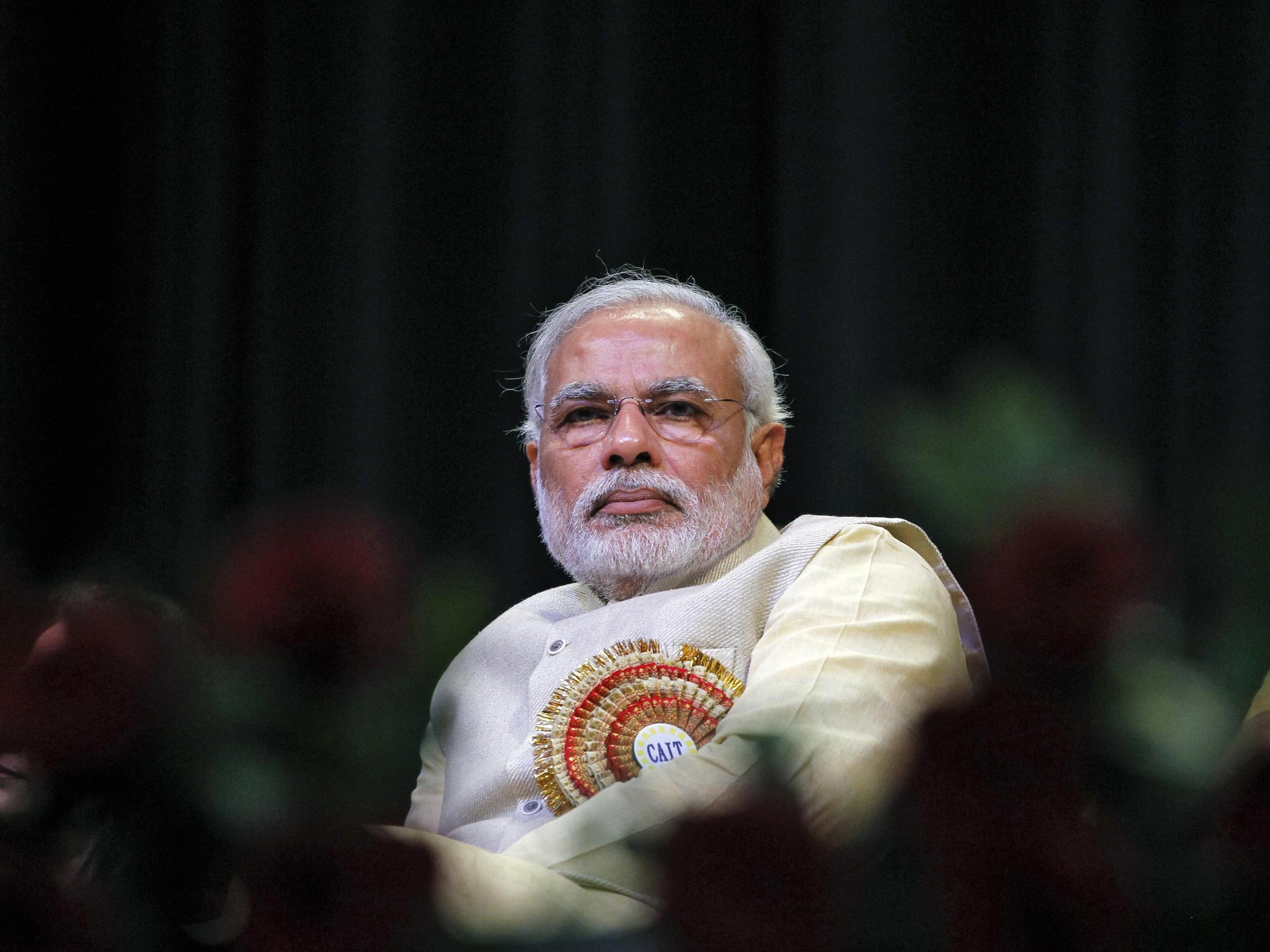Hindu nationalist Narendra Modi on course to win India's Prime Ministerial elections
While the electoral system is notoriously hard to predict, the chief minister of Gujarat appears to be cruising towards a significant victory

Your support helps us to tell the story
From reproductive rights to climate change to Big Tech, The Independent is on the ground when the story is developing. Whether it's investigating the financials of Elon Musk's pro-Trump PAC or producing our latest documentary, 'The A Word', which shines a light on the American women fighting for reproductive rights, we know how important it is to parse out the facts from the messaging.
At such a critical moment in US history, we need reporters on the ground. Your donation allows us to keep sending journalists to speak to both sides of the story.
The Independent is trusted by Americans across the entire political spectrum. And unlike many other quality news outlets, we choose not to lock Americans out of our reporting and analysis with paywalls. We believe quality journalism should be available to everyone, paid for by those who can afford it.
Your support makes all the difference.Narendra Modi is surfing a wave. But can he ride it all the way to the office of the prime minister? In recent days, a series of opinion polls appear to have confirmed what many in India long suspected – that weeks ahead of what may be one of the country’s most important elections, Mr Modi, the opposition leader, is way ahead of his rivals.
Only the courageous make predictions about Indian elections. They have proved notoriously hard to call, partly because of unreliable data. In 2004, most expected Atal Bihari Vajpayee’s Bharatiya Janata Party (BJP) to smoothly secure reelection. As it was, Sonia Gandhi led the Congress Party to a surprise victory.
Ten years on, this time with Mr Modi leading the Hindu nationalist BJP and heading a coordinated, fluent campaign, most analysts again believe the BJP has the momentum.
“As it stands, I would expect the BJP to cross the 200 mark,” said Malvika Singh, editor of Seminar magazine. “People in the country are in despair. There is no governance.”
India’s election is probably the largest democratic exercise in the world and is likely to be held over two weeks at the end of April and the beginning of May. The ruling Congress Party, headed by Mrs Gandhi and her son, Rahul, are struggling to compete with the charismatic but controversial Mr Modi, the chief minister of Gujarat.
The polls suggest Mr Modi’s attempt to pitch himself as someone who has overseen growth in Gujarat and who will tackle corruption head-on, has struck a chord. The most recent survey suggested that 60 per cent of voters preferred the BJP to the Congress and that less than a third of Indians are content. “With the Indian parliamentary elections just weeks away, the Indian public, by a margin of more than three-to-one, would prefer the BJP to lead the next Indian government rather than the Congress coalition,” said Pew.
Milan Vaishnav of the Carnegie Endowment in Washington said a survey by the Centre for the Study of Developing Societies in Delhi suggested the BJP may secure as much as 34 per cent of the total vote.
“The leading indicator of a Modi wave is the dramatic jump in the projected vote share for the BJP,” he said. “Furthermore, these gains have been marked both in the BJP’s traditional base in the north and west as well as in non-traditional areas.”

The polls appear appear to confirm a welter of anecdotal evidence one encounters across the country: the young man in a village in the impoverished state of Uttar Pradesh who says he wants to give Modi a chance, or the young woman in the window seat on a plane to Delhi who says young people across India are crying out for change.
The recent decision by the US government to end a decade-long boycott of Mr Modi that began in the aftermath of the massacre of hundreds of Muslims in Gujarat in 2002, may also be telling. Britain reopened contact with Mr Modi in 2012. Such incidents can only be snap-shots in a country of 1.2 billion people.
But the mood of anti-incumbency gripping India seems solid. People complain, repeatedly, about corruption, a slowing economy, the soaring cost of basic commodities and the drift that has marked the last two years of India’s outgoing premier, Manmohan Singh.
These days, compared to five years ago when the Congress was reelected with a reduced majority, it is rare to encounter someone who speaks warmly of the government.
In what may be the most telling sign of all, in recent days the Congress has been expending energy trying to ban election polls, saying they are inaccurate.
Mr Modi’s victory is far from guaranteed. India’s parliament has 543 seats and for Mr Modi and his coalition allies to slip past the 272 mark will need him to perform in places where the BJP has traditionally not done well, especially in the south and east.

It is in these areas, particularly, that India’s increasingly powerful regional parties are pervasive. Much could depend on post-poll horse trading as the BJP seeks to build a viable coalition. Will the strident, rough-edged Mr Modi, many ask, have what it takes to play nice? Another factor, not included in the questions addressed by the recent polls, is the late, chaotic arrival onto the political scene of the grassroots Aam Aadmi (Common Man) party. The AAP, led by its mercurial figurehead Arvind Kejriwal, secured power in Delhi only for them to stand down after 49 days when they failed to pass a bill for a local ombudsman.
Now the AAP is campaigning in the general election too, tapping into the same anti-incumbency mood that Mr Modi has been targeting. If Mr Kejriwal could win 30 or 40 seats, could that be enough to steal Mr Modi’s thunder. Could it even open the way for a so-called Third Front government?
Every Indian election is a vast piece of political theatre. This year it is likely more than 1,000 parties will be seeking the support of around 800m voters. From Kerala to Tamil Nadu, and the 33 other states and “union territories” in between, there will be 800,000 polling stations.
Yet beyond that, observers say this year, things are at stake like never before. Supporters of Mr Modi say he is the only person who can end India’s crippling corruption and create the stability and growth that could benefit both ordinary people and business.
His opponents say he is a dangerous extremist who could tear at the very fabric that holds India’s vast diversity together.
Most of those who have seen a lot of elections are reluctant to make a prediction.
“You can say that it seems Mr Modi is ahead,” said Swapan Dasgupta, a conservative writer and commentator. “But it is really too early to be sure.”
Join our commenting forum
Join thought-provoking conversations, follow other Independent readers and see their replies
Comments